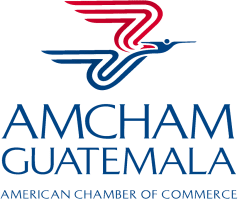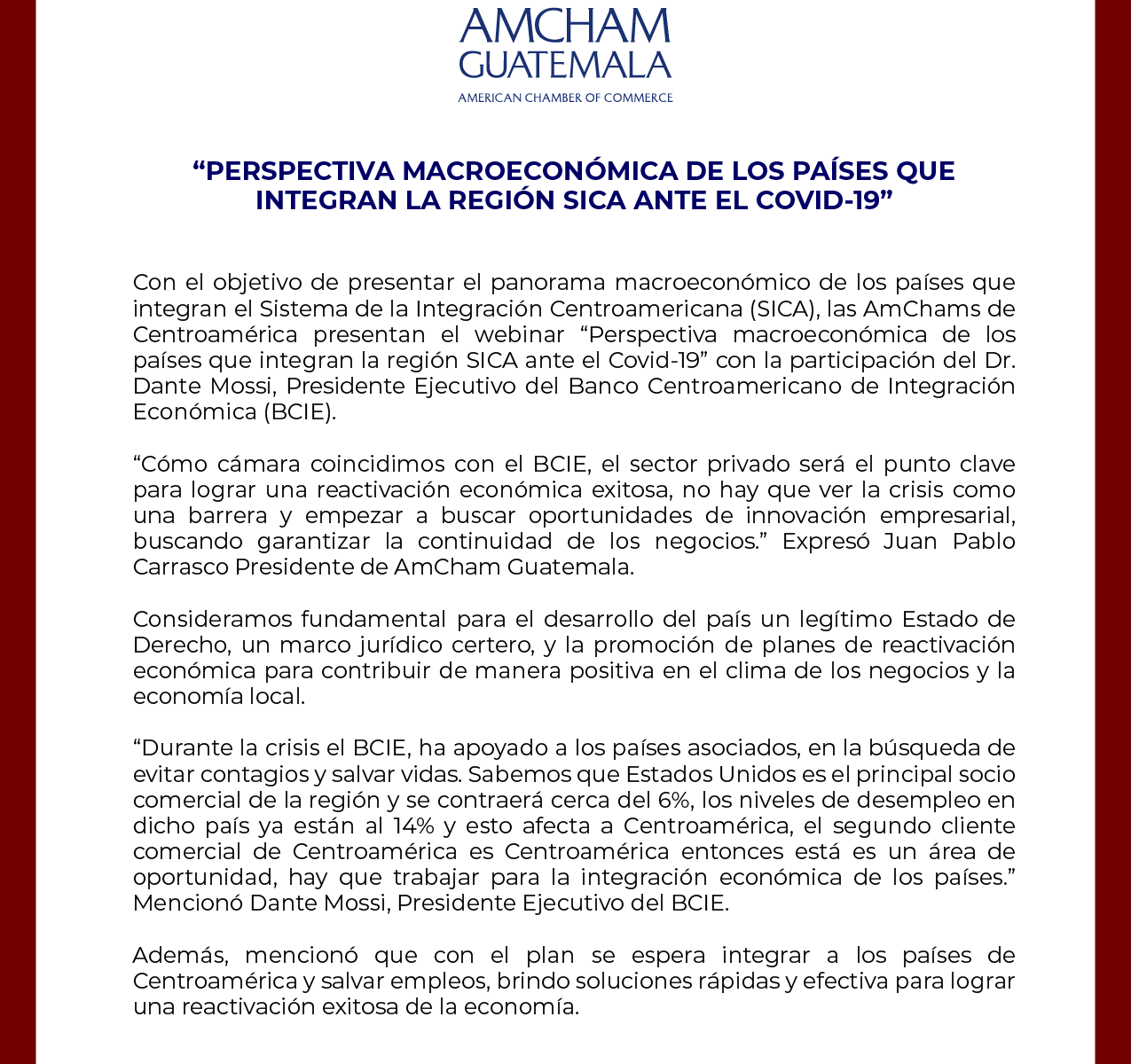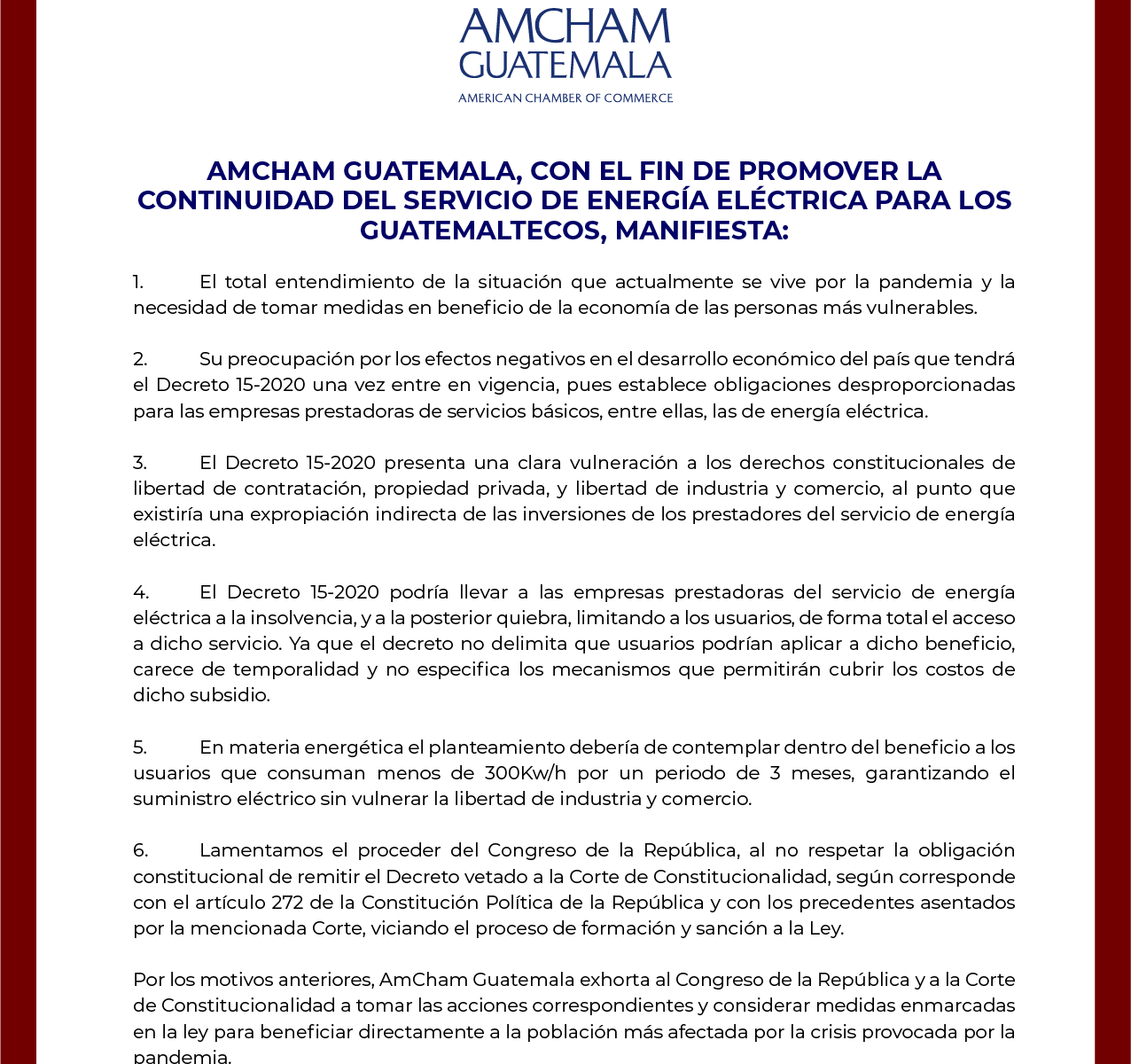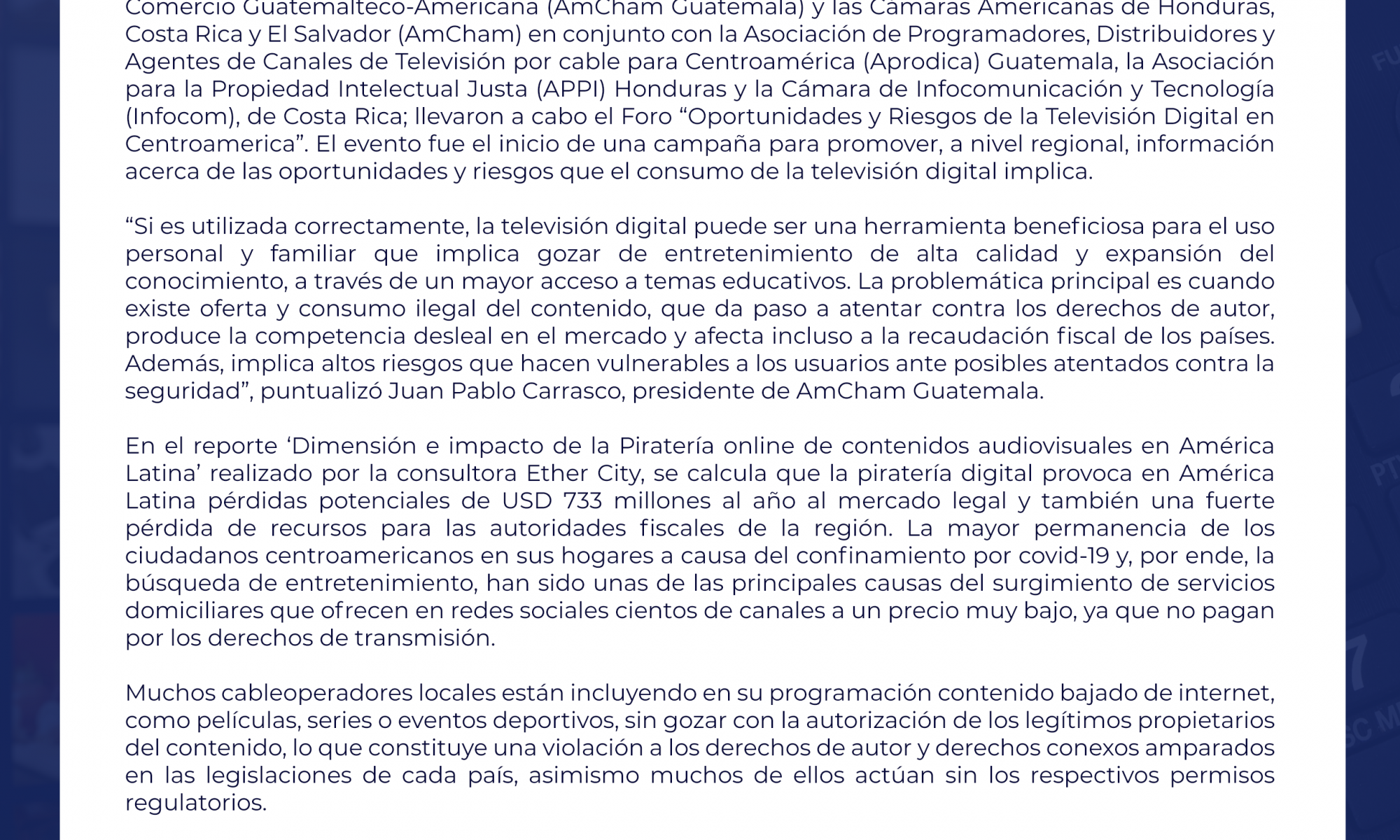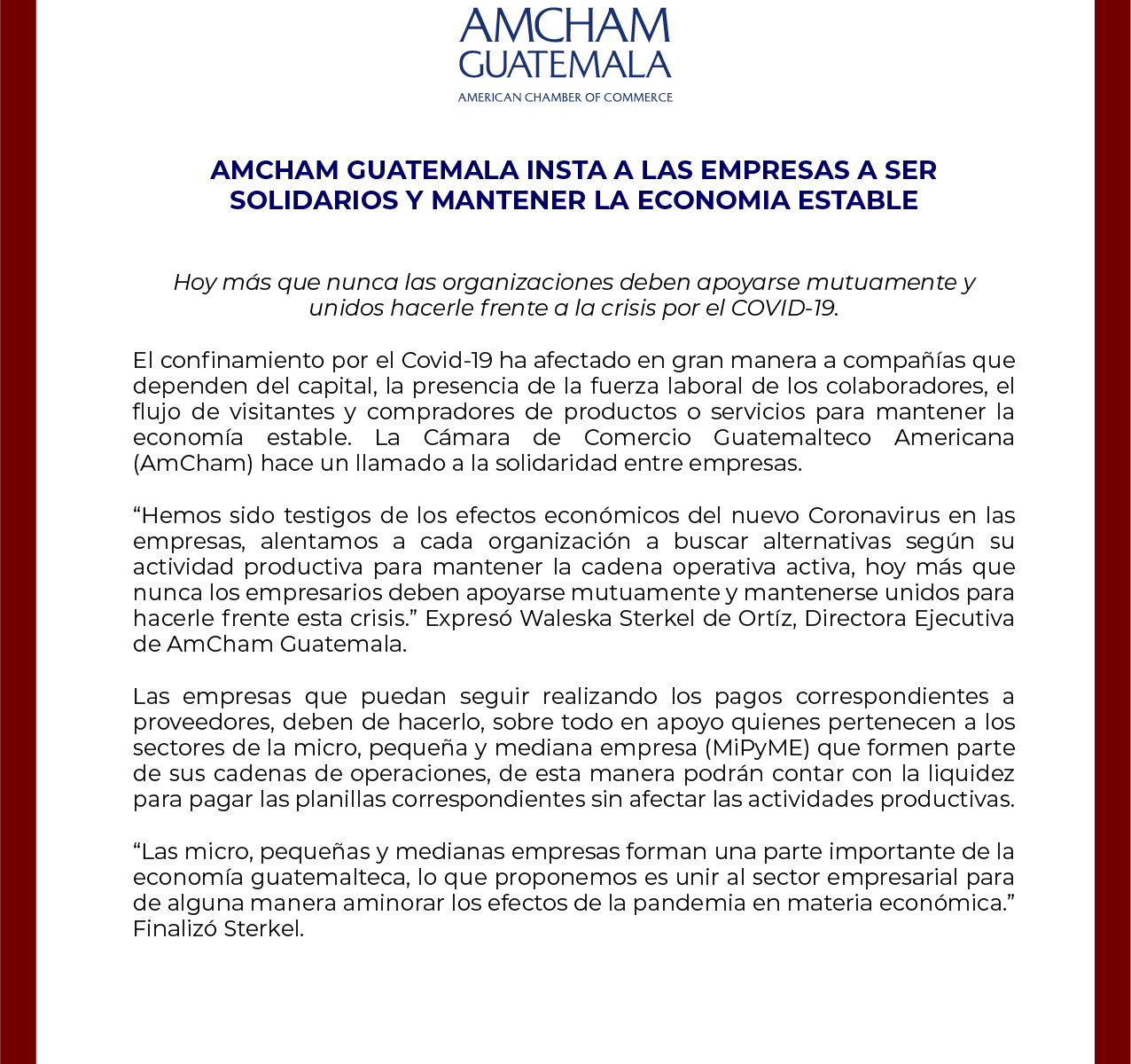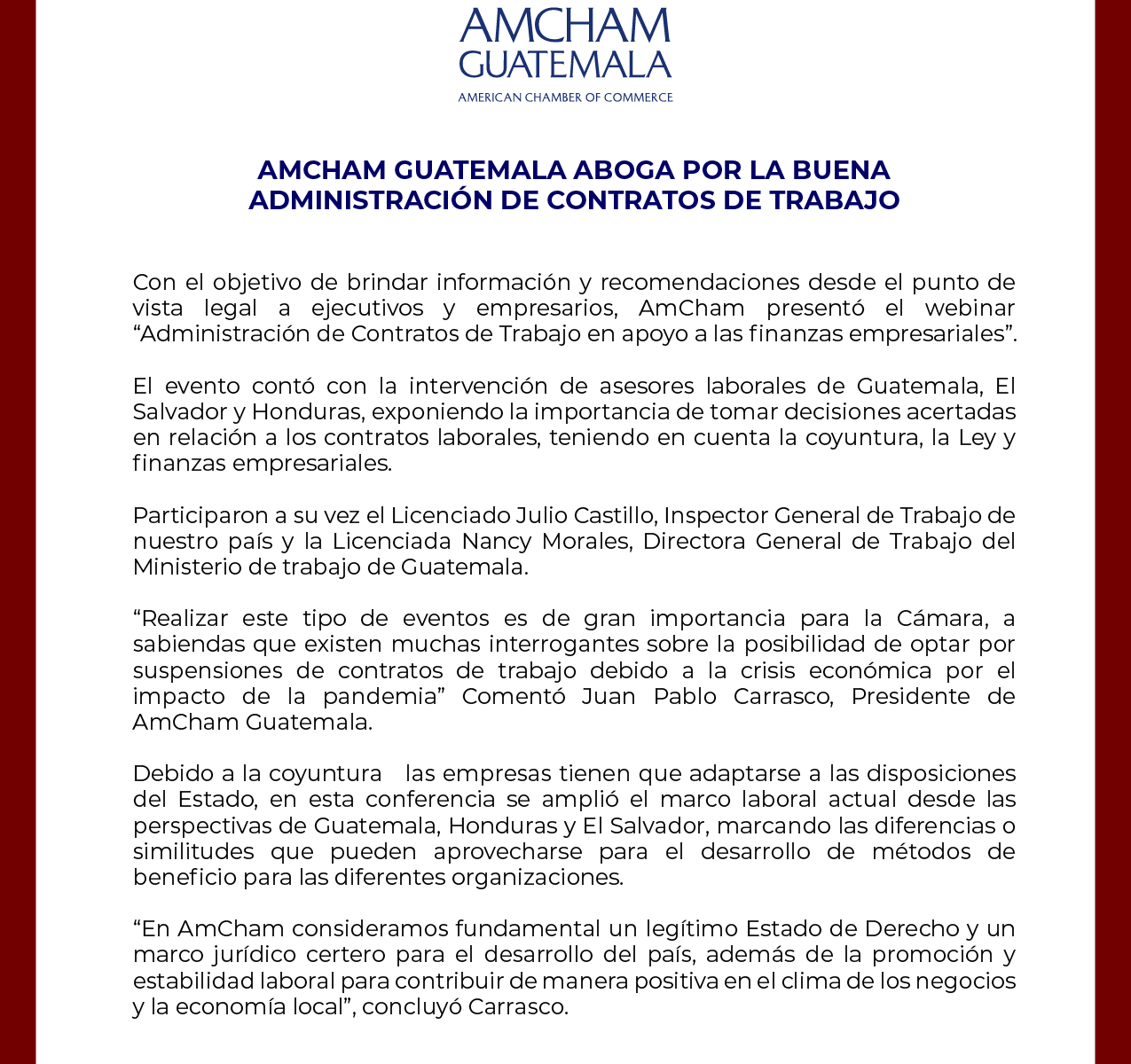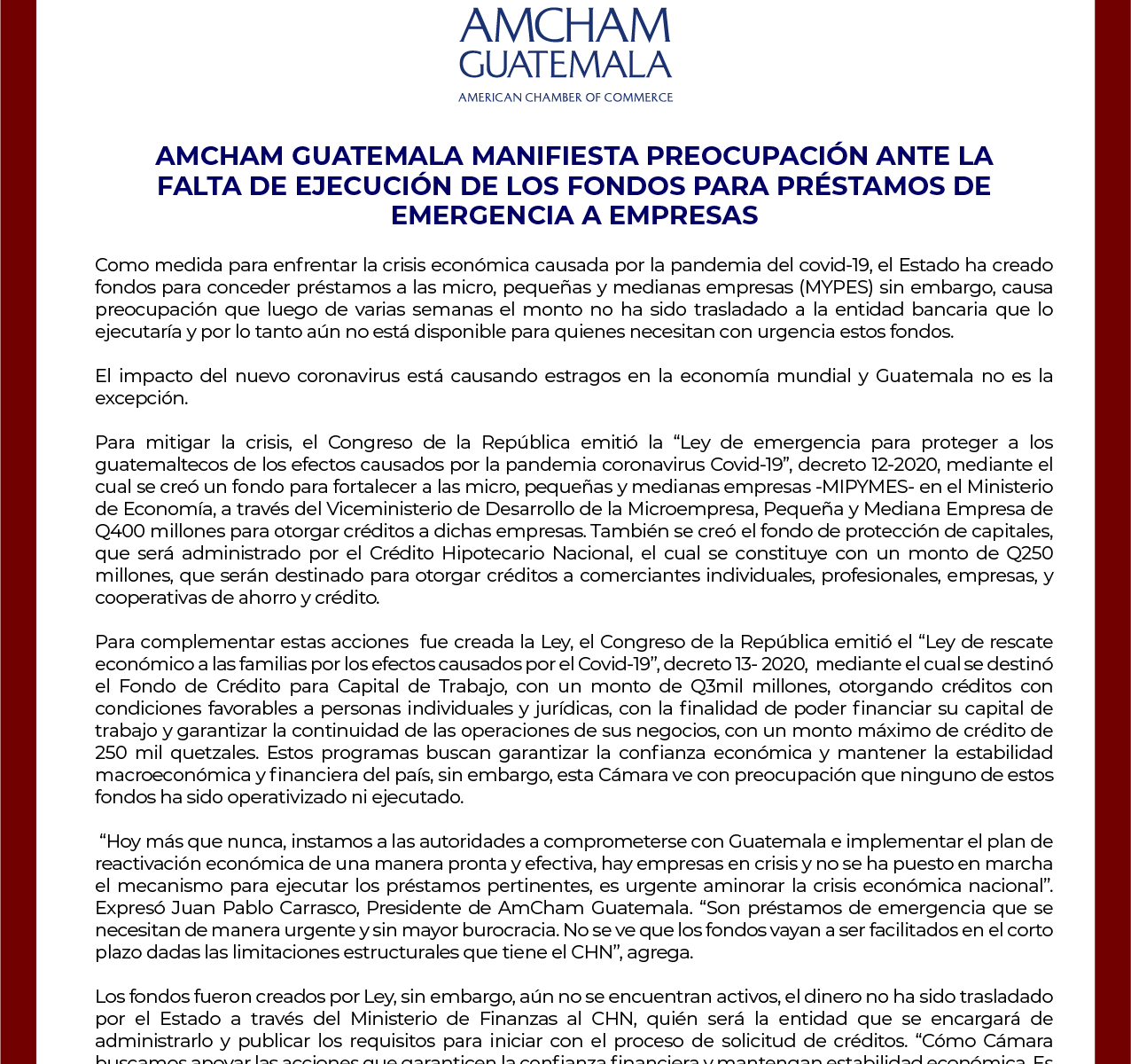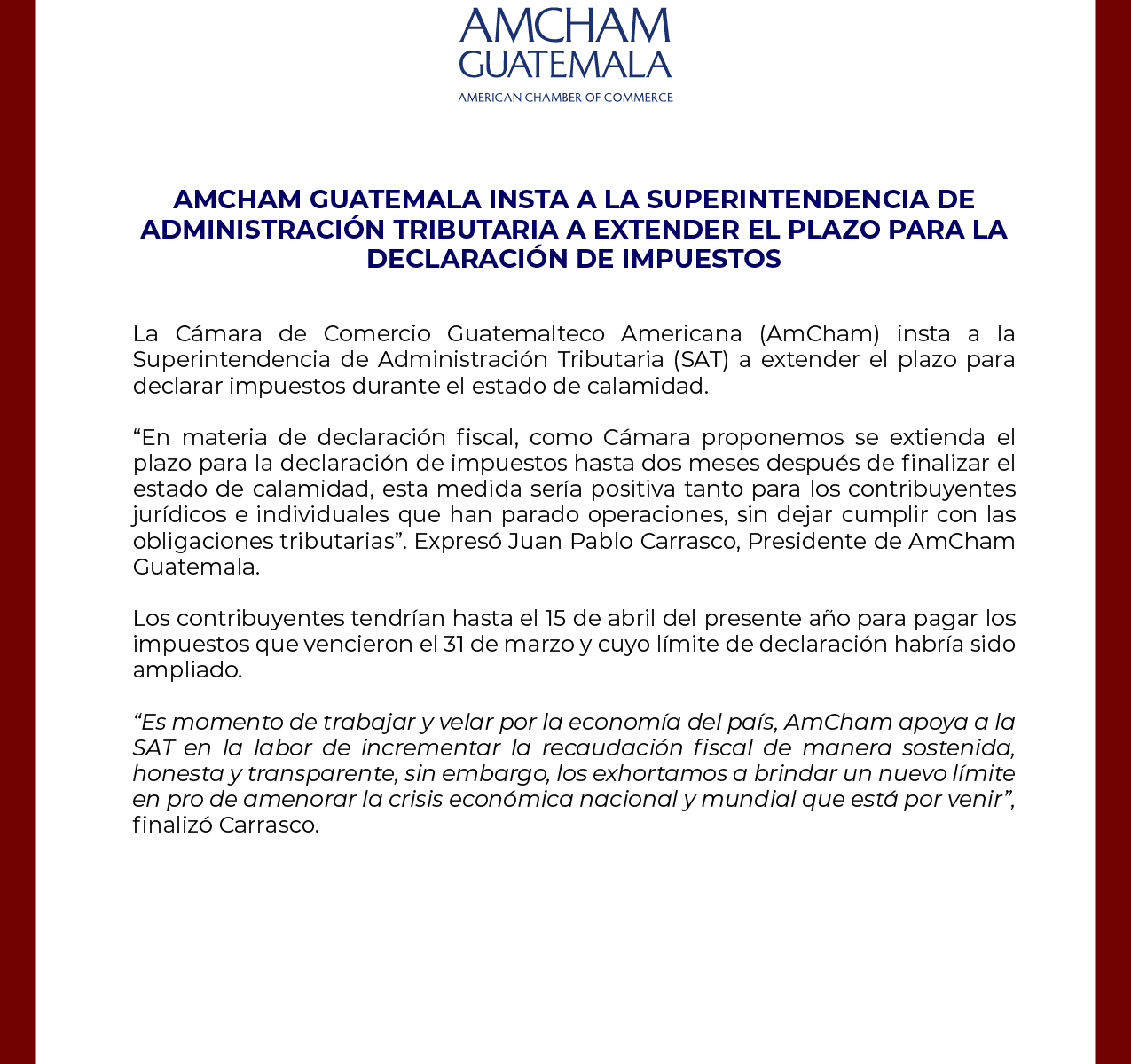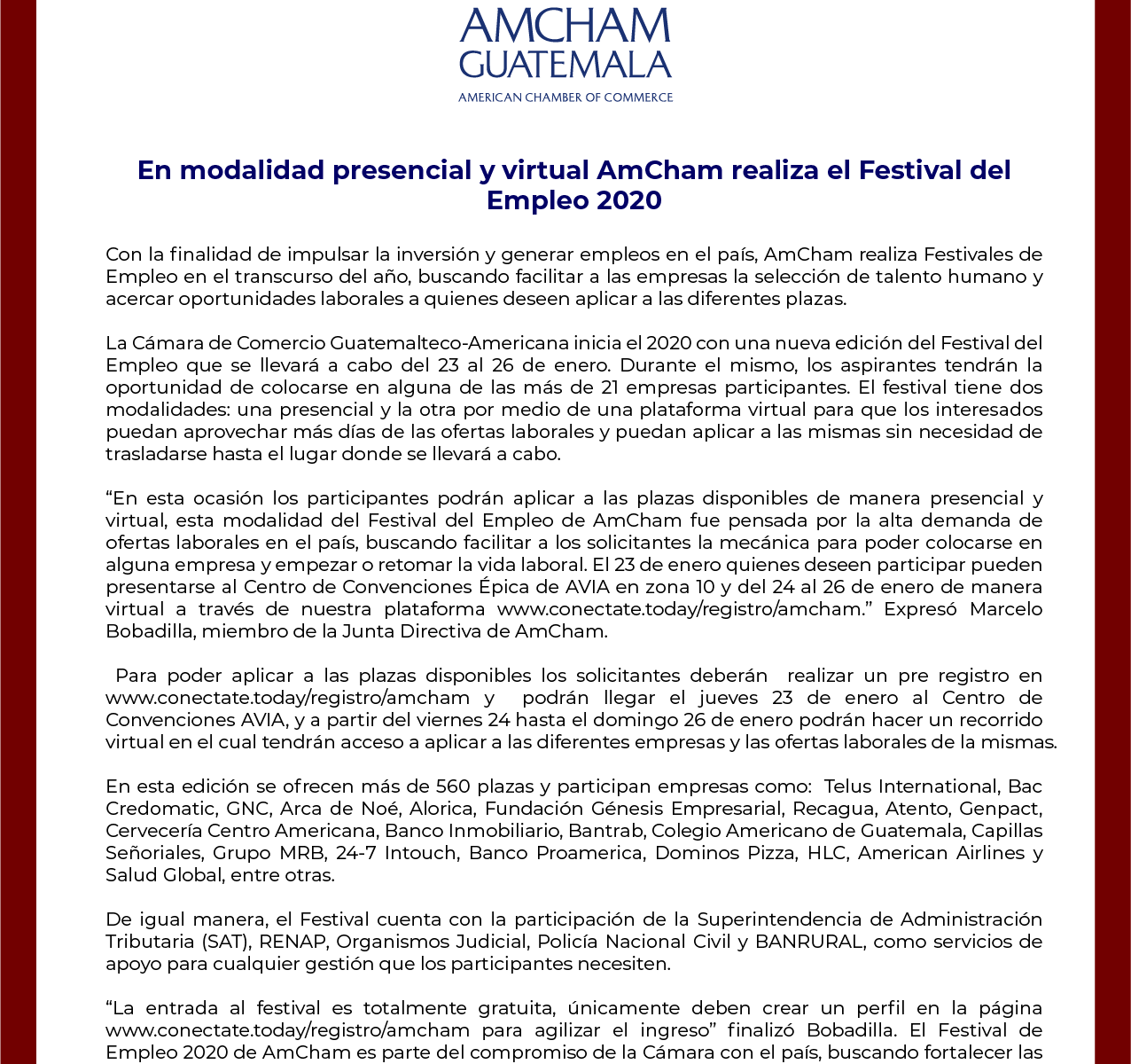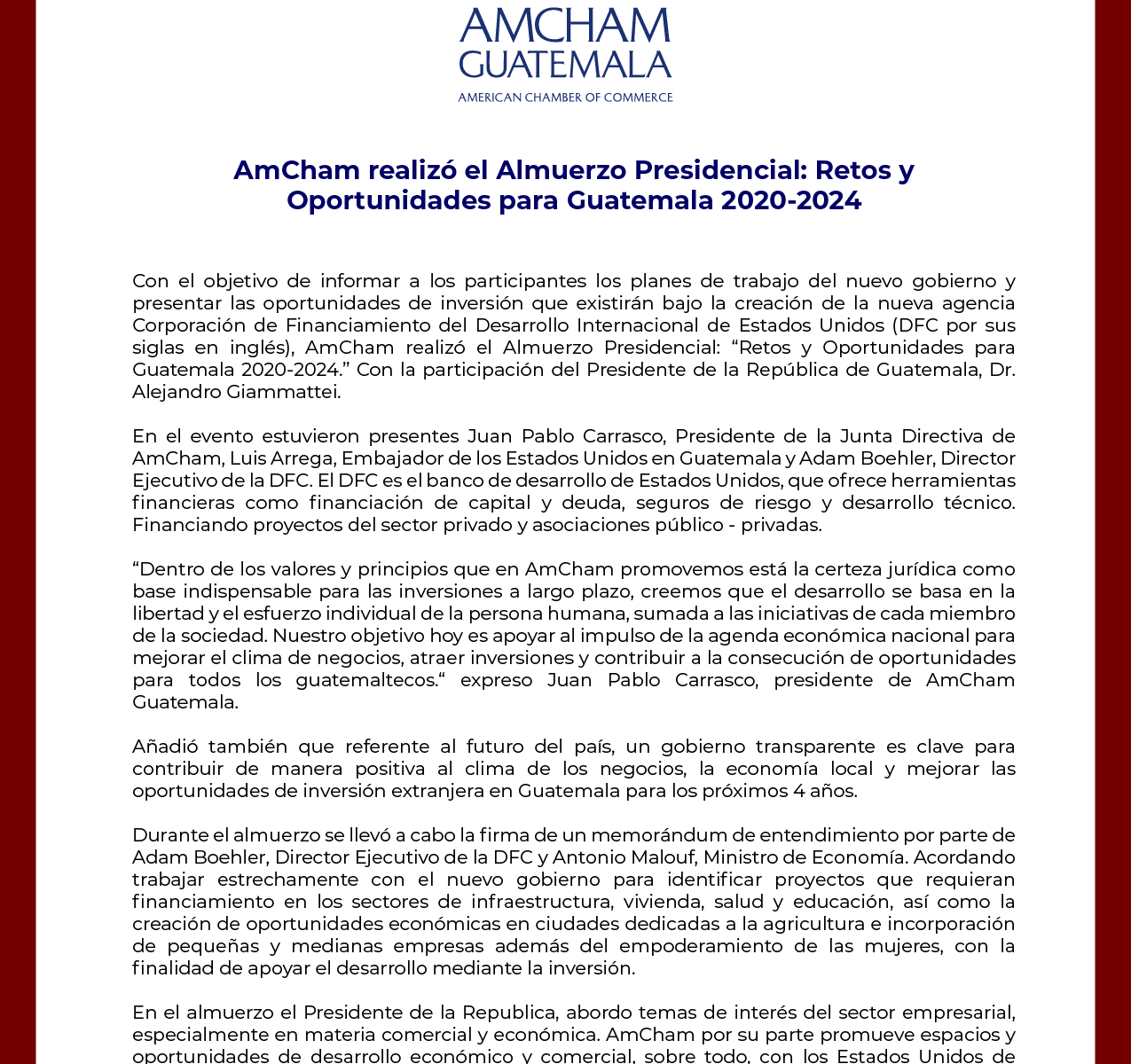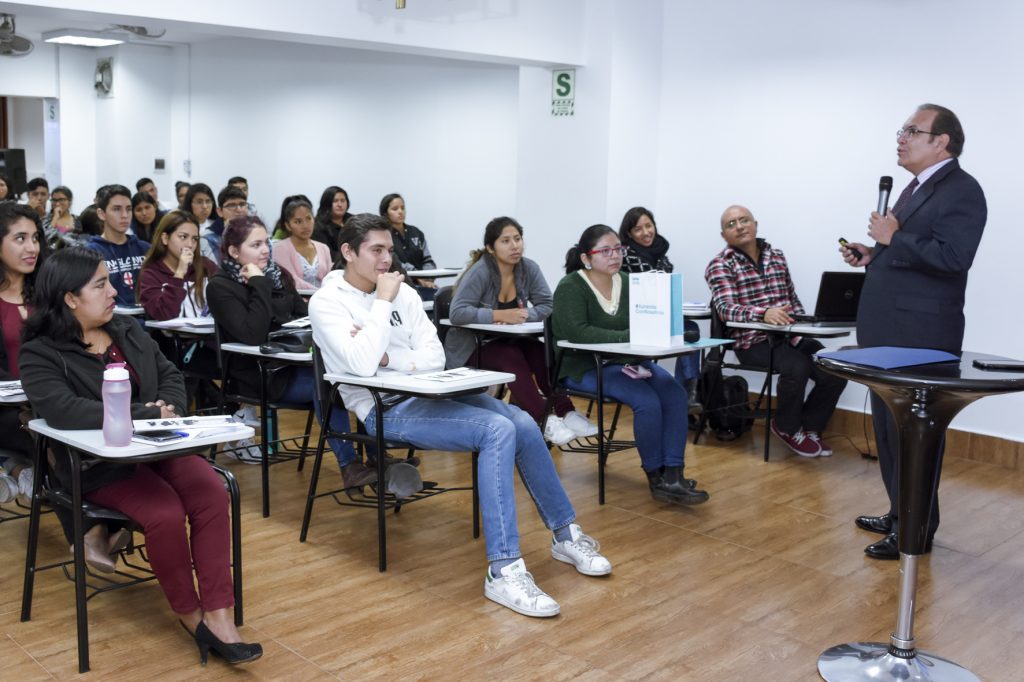2020 – Continuity of energy service
2020 – AmCham – APRODICA
2020 – Solidarity among entrepreneurs
2020 – CONTRACT ADMINISTRATION
2020 – LACK OF IMPLEMENTATION OF FUNDS
2020 – Extension of tax return deadline
AmCham Connect Guatemala. Tu comunidad de negocios Online
AmCham Connect Guatemala
2020 – Employment Festival
2020 – Presidential Lunch
Guatemala Overview
Guatemala Economic and Political Overview
Presidency and Company
Guatemala is in an important electoral process, which puts us at a key moment to think about the ones who aspire to be the new president of the country. This thought should assimilate to the thought that a new General Manager of a company must have in a country with many complexities.
It is no secret that most Latin American countries paint a scenario with alarming rates of corruption and citizen insecurity, with low levels of infrastructure, investment and low levels of trust in their public authorities. It is precisely this scenario that the leaders of the national productive sector engage.
For what I propose, what should offer that who wants to be president of the country?
If you are the leader of a company that offers an innovative good and/or service that is well accepted in the market; if you already manage your productivity volumes, but you deal with a number of other negative factors that surround you, what do you do? You can continue working internally and wishing the best to the outside? Or is it involved with the external, to see better results internally?
Internally you can also discuss between continuing with the same procedures and processes, or new trainings and improvements are considered.
If we see it that way, there really is not much difference between what a candidate is questioned about and what you expect from a Board Member and a General Manager of a company. And both can conclude that, just by adapting, training, and innovating, they will be able to overcome and work with the disadvantages that the current environment presents.
After all, the President of the country and a CEO of a multinational are not so different, both must work to break the status quo that seems to have been established indefinitely in our country, so we can dedicate ourselves to the pursuit of economic development, growth and prosperity.
Constitutional or political laws?
Every Guatemalan entrepreneur has the right and duty to actively participate and transparently contribute to build a Rule of Law with clear rules consistent with the law and the Constitution, in an aim to promote a healthy business culture and at the same time, create sources of employment in the country. Similarly, the involvement of the business sector must be reflected in the fight against the smuggling of all kinds of products, from those included in the basic basket, to cigarettes.
In June 2018, the Guatemalan Congress presented a Tobacco Control bill (5461), which aims to make important and necessary decisions for the health of Guatemalans. However, in order not to neglect the country-wide commitments made through international treaties and, in its capacity as a member of important organizations such as the World Trade Organization, AmCham Guatemala, in conjunction with other national chambers, performed a legal, technical and constitutional analysis of the bill. Guatemala is the only Central American country that does not have a Cigarette Pictogram Law. However, bill 5461 is constitutionally deficient in other aspects that set a very negative precedent if a favorable opinion is issued.
Such a favorable opinion, in addition to jeopardizing the country’s compliance of its obligations under International Law, would affect the local market by indirectly promoting more contraband. With this in mind, the national business chambers have joined us and we have presented to Congress legal, technical and constitutional arguments that seek to achieve public health objectives, while proposing changes to the bill to actively contribute and defend legality.
The Health Commission of the Congress of the Republic is currently analyzing a draft opinion of the aforementioned bill. We suggest that the members of Congress analyze this bill from a constitutional and legal perspective to make a difference. We see today how more and more State agencies are discredited; Congress may be the exception by favoring constitutional and technical analyses and contributing to legality and the Rule of Law.
Silicon Valley lessons
“Creativity requires having the courage to part with certainties”
-Erich Fromm
Silicon Valley, known as the capital of the world of start-ups, is the destination to visit AmCham Guatemala soon, on a trip that has the mission of learning to trust instincts. Especially those instincts of the most curious, those who seek innovative solutions to everyday problems, those who travel the extra mile and those who do not get tired of exploring!
Some may wonder why Silicon Valley? Why seek to learn lessons from a perfect ecosystem and perhaps even so far from Guatemalan reality? And it is that technology, rather than widening the daily realities gap, seeks to contract it and bring new opportunities for a fertile land like our region and country.
At AmCham we believe that technological advances and innovation are the way to development. Studies indicate that the countries that are more likely to implement new ways of doing business are finally those that have made significant progress in the competitiveness and development indices. Likewise, it is these countries that have seen the birth of new business models and important tools and services for the communities. Technology allows us to spread stories and ideas that generate global and local impacts.
The mission to Silicon Valley will be the ideal scenario to generate a community that promotes a collective identity, in which cultural values are mixed with new ideas and translates into an opportunity to reinvent businesses, how to do them and the people who They make it possible.
Fight against corruption as an encouragement to competitiveness
Beyond the citizens’ movements of 2015 and the role that the United Nations Commission against Impunity in Guatemala (CICIG, by its Spanish acronym) has played to unravel organized crime and corruption networks, Guatemala has been on a long path that seeks to align itself with the international anti-corruption agenda. It is becoming more and more clear that in order to achieve sustained economic growth, bring investment and be competitive, the key to change lies within institutional strength and public power’s level of social audit. In order to promote this competitive and productive infrastructure, it is relevant and necessary to fight against corruption.
Corruption – the abuse or misuse of power for private purposes – is one of the problems that remain throughout the world, affecting legal certainty and credibility within public institutions. The fact that only a few get benefit through preferences, results in a widespread sense of mistrust affecting a country’s productivity. This mistrust is responsible for keeping institutions weak and unable to function as they should, since the citizen does not see an incentive to demand accountability or participate in fair play; moreover, some find it convenient that the system fails. If we have weak institutions, rules are easier to break, the lack of institutional credibility and disapproval increases and each time we do less to recover them.
This vicious circle of institutional weakness and citizen apathy makes it difficult to achieve sustainable economic growth and development, distorting competition and the free market, since some groups, companies or individuals will be artificially benefited. Moreover, it is a waste of economic and social capital that affects growth and increases inequality and poverty, feeding and reproducing mistrust. As Shleifer and Vishny have suggested, corruption takes the form of a tax on economic activity that becomes even more expensive (and of course harmful) than legal taxes, adding an additional financial cost of approximately 10%.
The most recent Global Competitiveness Index (2017-2018) published by the WEF measures the national competitiveness of 137 economies; that is a group of institutions, policies and aspects that determine the level of productivity. The social infrastructure which includes education, health and political institutions (including fiscal and monetary policies), establish the context in which productive activity takes place. In the last five years, Guatemala has not changed much its rating. It currently ranks 84th, with an index of 4.1, being 7 the highest rank and 1 the lowest . Like most Latin American countries, Guatemala has low productivity, high informality and low export diversification, as well as insufficient growth to create jobs or finance which is a growing demand for quality public goods. Therefore, it is necessary to strengthen their capacity to meet changing international conditions and seek new ways of sustainable growth through a competitive agenda to encourage entrepreneurship and allow the rise of new innovative businesses.
Currently, standard international compliance rules are developing and being applied that force companies to pursue anti-corruption policies in order to remain competitive, strengthen their reputation and protect the interests of their shareholders. Aware of the economic and social impacts of this disruptive behavior, international organizations such as the United Nations Office on Drugs and Crime (UNODC), the Organization for Economic Cooperation and Development (OECD) and WEF continue to promote policies to prevent, detect and control corruption in countries, in order to facilitate their economic development and growth, rather than end up isolating themselves from the new way of exchanging and investing.
The current consensus is now that economic growth, needs to focus more on human well-being, with coordinated action by the state, the business community and civil society. These actors contribute to all aspects of competitiveness at the same time, in order to achieve long-term results, achieving economic policy spaces where all sectors are able to win. The distortions caused by corruption can be effectively addressed through public-private partnerships focusing on strengthening political institutions and providing a counterweight through accountability, performance evaluations and encouragement of pending reforms. Guatemala is, in fact, already engaged in this process of change towards a different way of doing things.
Fight against corruption increases willingness to do business and invest, not the other way around. Economic growth and productivity based on appropriate social and institutional infrastructure improves competitiveness in due time, because legal certainty and social trust is recovered, establishing a new order of incentives that make up a fair play. Under this new scenario, competitiveness contributes towards a wider target of human-focused economic growth, enabling the creation and distribution of resources invested in education, health, security and higher per capita incomes.
Guatemala Safe from Trade Wars
Autor: Michael McDonald, Business Reporter for Central America & Caribbean, Bloomberg
The United States-Guatemalan trade relationship is healthy even as President Donald Trump has ramped up trade wars with major partners like Mexico and China.
Guatemala sends roughly 40% of its exports to the United States, mainly bananas, coffee and textiles, making it the top destination for Guatemalan goods. The U.S. imported $4.2 billion worth of Guatemalan products in 2018, up 5% from the previous year. Guatemala, in turn, imports a large share of its oil from the U.S. and has benefited from lower prices in recent years.
The CAFTA-DR trade agreement has not drawn the ire of Trump like similar agreements such as NAFTA. This has kept trade barriers low and allowed goods to flow freely between the two nations without interruption.
The U.S.-China trade war may actually represent an opportunity for Guatemala. China exports mainly manufactured goods to the U.S. and Guatemala could attract some of this manufacturing, especially in the textile industry where it already has the infrastructure and know-how, as relations between China and the U.S. remain tense.
The top threat to Guatemala’s exports is currently a spate of low commodity prices. Coffee prices are near 13-year lows, driving many farmers into debt and out of business. Sugar prices have also declined in recent years and are hovering around their lowest since 2015.
It would be unlikely for the U.S. to adapt a major trade policy shift toward Central America and commercial relations should remain positive in the months to come.
Economic Perspective Guatemala 2018
Guatemala has been showing stable growth rates since 2010 thanks to its prudent macro-economic performance. The estimated growth rate for 2018 is 2.8% and for 2019, the Central Bank of Guatemala’s projections place it at between 3.1 and 4.1%. However, just like other countries of the region, Guatemala continues to phase major challenges due to legal uncertainty, corruption and crime, which harm foreign investment and lead to high economic costs.
On the other hand, Guatemala continues to experience significant progress in areas such as road infrastructure, education, and poverty reduction, as well as in its updates to the Trade Code, which will promote more private and public investment, as well as more human capital development.
For November 2018, Moody’s and Fitch maintained Ba1 and BB ratings respectively, with stable perspectives. This reflects confidence in the country, and no perception of deterioration, which promotes foreign investment. Like any process of continuous improvement, the country relies on indicators such as global competitiveness index (ranked 84), infrastructure (6 out of 10 points), unemployment, and poverty to improve its national competitiveness and productivity and thus earn a higher rating that leads access to more foreign investment.
In recent years, interest rates have shown a moderate behavior, which is indicative of a cautious monetary policy. According to data from the IMF, in September 2018, the inflation rate was 4.55%, which is a monthly rate of 0.60%, and an accumulated 2.13% inflation rate. The inflation rate projected for 2019 is between 3.6 and 4.5.
CPI and variations
| Year | Month | Index | Monthly | Accumulated | Inflation rate |
| 2017 | September | 130.93 | -0.55 | 3.23 | 4.36 |
| 2017 | October | 131.64 | 0.54 | 3.79 | 4.20 |
| 2017 | November | 132.77 | 0.86 | 4.68 | 4.69 |
| 2017 | December | 134.03 | 0.95 | 5.68 | 5.68 |
| 2018 | January | 133.50 | -0.40 | -0.40 | 4.71 |
| 2018 | February | 133.23 | -0.20 | -0.60 | 4.15 |
| 2018 | March | 133.54 | 0.23 | -0.37 | 4.14 |
| 2018 | April | 133.60 | .0.04 | -0.32 | 3.92 |
| 2018 | May | 134.23 | 0.47 | 0.15 | 4.09 |
| 2018 | June | 135.00 | 0.57 | 0.72 | 3.79 |
| 2018 | July | 135.48 | 0.36 | 1.08 | 2.61 |
| 2018 | August | 136.08 | 0.44 | 1.53 | 3.36 |
| 2018 | September | 136.89 | 0.60 | 2.13 | 4.55 |
Source: Produced by authors with information from the National Statistics Institute 2018.
Family remittances made to Guatemala grew by 12.6% between January and October 2018 from 2017. It is important to underscore that foreign currency from family remittances is expected to contribute more than 11% to the GDP.
The oil price drop and likely economic deceleration in the United states resulting from its trade war with China could impact exports in 2018. However, traditional exports remained stable or grew when comparing January 2017 with January 2018 in commodities such as: bananas, sugar, coffee and cardamom, with rates of 53.1, 83.4, 45.7 and 48.2, respectively (in millions of US Dollars) according to Bank of Guatemala data.
For 2018, the preliminary CIF imports for September will close with a total amount of USD 14,577.2 million, and they are expected to exceed the 2017 total of USD 18,389.8 million. The trend in interannual accumulated variation rates for imports is estimated at between 6.5 and 9.5 by the end of 2018, and at 6.0 and 9.0 for 2019.
The flow of foreign direct investment in 2018 will be 1,175.3 million U.S. Dollars. This flow increased only slightly by comparison with 2017 because of the limited improvement in legal certainty and due to political instability, both of which factors have had a negative impact on potential investment decisions.
Guatemala’s indicators progress at a slow growth rate; investment through public spending particularly in social factors and infrastructure is expected to increase. With sufficient resources to support economic activities, and with significant time reductions in border crossings and Customs procedures, this slow growth pace could accelerate.
Globase 2019, an opportunity to grow for small and medium-size enterprises in Quetzaltenango
Globase is the program created between the University of Indiana and AmCham Guatemala where senior year MBA students of the Kelley School of Business provide free-of-charge consulting to small and medium-size enterprises on topics such as marketing, processes, administration, finances and other.
The final reports of the consulting service provided to 5 companies in Quetzaltenango were submitted on March 8. Solutions were offered and challenges were addressed, such as process optimization, the creation of standard feedback systems, the standardization of hiring processes, the definition of added values before highly competitive markets, among others.
The beneficiaries, who received free consultation through 11 virtual weeks and 1 face-to-face week, were: Copeoro R.L., a non-profit organization that provides savings and loan services; Tacorazon, a socially-responsible fast food chain whose goal is to bring prosperity to small producers selling organic food to their consumers; ISSE, a logistics operator that represents DHL in the Quetzaltenango market; Caras Alegres Foundation, an NGO that focuses on providing support to Las Rosas community offering extracurricular programs to children; and Manos de Salvación, an NGO dedicated to providing health and safety to women, the elderly and children.
We invite all companies in Quetzaltenango to be aware of the launch of Globase 2019 – 2020 and benefit from this project that seeks to empower this urban hub to become a source of employment in the second most important city in the country.
An opportunity to increase the attractiveness of investment
The National Competitiveness Policy is a coordinated effort between the production sector, civil society, the academy, the trade union sector and the public sector. It aims to address three compelling demographic phenomena: the population growth, by 2032 the Guatemalan population will be around 22 million people. Then, there will also be the demographic dividend phenomenon, which will be when the workforce will outnumber the retired, and this will cause an extraordinary increase in the employment demand. Finally, there will be a transition from rural to urban. By 2032, it is estimated that 79% of the population will live in the urban centers.
It is organized under three strategic guidelines called 11-11-9: 11 clusters -11 competitiveness priorities – 9 suitable territories to be established as intermediate cities. The foundations are located in the 12 pillars of World Economic Forum, incorporating two additional cross pillars: social and environmental sustainability. This thereby increases productivity and creates greater economic growth for the country.
Guatemala is currently at a defining moment in creating conditions that will allow the Guatemalan population to have greater access to employment opportunities and, consequently, higher levels of well-being and prosperity. In order to enhance this opportunity, this policy suggests the development of cluster structures. These helps strengthen the productive and economic dynamics generated from the territory. In addition, it makes it possible to consider the differentiated social and productive characteristics of clusters, promoting inclusive economic development. The Policy defines actions to consolidate the economy between agglomerations of people with better productive and purchasing capacities, promotes increased productivity, allows the generation of scale and operational efficiency, while stimulating innovation and facilitating marketing, and the development of new businesses and resilience.
The eleven main clusters are: 1) Forest, furniture, paper and rubber, 2) Fruit and vegetables, 3) Processed foods, 4) Beverages, 5) Textiles, clothing and footwear, 6) Metal Mechanics 7) Tourism and health services, 8) Transport and logistics, 9) TIC´s, software and call centers 10) Construction 11) Light manufacturing. By 2032, these are capable of creating more than five million production jobs in high demand industries both nationally and internationally. Plus, they remain quality products and services provided.
The development of clusters requires different productive sectors to overcome gaps that restrain competitiveness. That is why the Competitiveness Policy develops the Priorities, divided into two agenda. The first addresses issues that impact at the national level (Horizontal Agenda): to eliminate corruption, increase legal certainty, increase security, improve educational quality, end chronic malnutrition. The second addresses local and sectoral levels (Vertical Agenda): to reduce the costs of bureaucratic processes, improve infrastructure and logistics, sustainability of the electricity subsector, boost research, development and innovation, strengthen the entrepreneurial ecosystem and increase the attractiveness of foreign investment.
Guatemala is a perfect investment destination because it has an excellent geographic location to access booming markets, outstanding macroeconomic stability, free currency negotiation and financial resources under optimized conditions. The Competitiveness Policy advocates for the generation of greater political stability, institutional strength, legal certainty, flexibility in labor laws, private property respect, skilled labor and good infrastructure, among others.
The Competitiveness Policy actions include: the process simplification through the asisehace.gt tool, the regulations update such as the Code of Commerce amendments which reduces costs and time in the companies’ registration, the amendments to movable guarantees law which gives access to credits to people who do not have real estate guarantees, the factoring law and a legislative agenda aimed at encouraging investment and employment generation. They also support actions to improve the population’s skills, including educational programs, entrepreneurial ecosystem promotion and innovation through business training, innovation encouragement. Plus, it supports strengthening local economic development by providing competitive tables.
The identification of nine territories suitable for development established as Intermediate Cities would improve the coverage of basic services, provide a response to the economic, political and social dynamics between the city and the countryside and would guarantee the flow of people, goods, capital and knowledge. The following map shows the location of these territories.
The National Competitiveness Policy enables an appropriate approach to interventions and investments required to address competitiveness gaps and enhance the productive activity of clusters identified in territories suitable for urban development. It represents a greater degree of detail regarding analysis, the actions to be executed and the interinstitutional and intersectoral coordination as strategic planning tools, in order to unify the efforts towards the fulfillment of the same goal: Improve competitiveness to increase national productivity and thus generate inclusive, accelerated and sustainable economic growth.
Víctor Asturias
Presidential Commissioner for Competitiveness and Investment
National Competitiveness Program – PRONACOM
The importance of Regulatory Compliance Program
In Central America, Panama and the Dominican Republic, current laws against asset laundering and other related crimes define measures which, according to the level of risk, must be implemented by natural or legal persons who engage in non-designated financial activities and professions to prevent their use or their direct participation in the asset laundering crime.
To that end, said laws impose on companies, legal firms and professionals like lawyers and notaries, among others, the obligation to report certain transactions and carry out due diligence of current and potential customers.
Penalties for non-compliance with the aforementioned laws include fines and imprisonment of four to twenty years depending on the type of participation of the natural or legal person in the crime or crimes persecuted, for example, for having participated, having acquired, being an accomplice and/or having provided advice.
Until the enactment of the laws on the prevention of money laundering and other related crimes, these measures to prevent money laundering fell solely on the banks. However, as it is not only banks that handle money, it became necessary to also control transactions made by companies, legal and professional firms such as lawyers and notaries, and demand that they take measures to know their customers, contractors and suppliers and have the backing of all the necessary information.
Laws against money laundering and other related crimes are some of the norms that every company, including legal firms, must comply with.
To better control compliance, it is advisable that all related rules be included in a Compliance Program. This program, to be fulfilled by all the members of the organization, has to be created by a team with expertise in the subject and with as many resources as possible.
In this sense, a Regulatory Compliance Program must contain not only the internal rules of the company or law firm, such as regulations, trademark manuals, and code of ethics, but also external regulations that, depending on its activity, industry or sector, or the jurisdiction where it is located, must comply with together with the rules that the stakeholders, whether private and/or public, with which they do business, require from them.
It is important that, inv view of the number of standards that the Compliance Program may include, it design the necessary procedures that ensure their compliance, and which is supervised, updated, and which lists who is responsible for their monitoring.
The importance of the design of a Regulatory Compliance Program lies in clearly establishing the action policies that will be necessary to comply with all the internal and external regulations of the company and, at the same time, to detect the risks due to non-compliance and mitigation. Failure to comply with these rules could result in millions in losses for companies, and both the law firms and independent professionals must be up to date with new legislation, its regulations and its enforcement, to be able to provide internal and external advice based on them.
The legislation and the current global trend in Compliance shows a way forward and leads to awareness that compliance, with all internal and external regulations by companies, law firms, professionals such as lawyers and notaries, among others, not only gives these orders, but also provides greater security and transparency when doing business in the region.
Guadalupe Martínez Casas – Director of Law Services
CENTRAL LAW – Central America, Panama and the Dominican Republic
Agile or irrelevant – Redefining resilience
During 2019, KPMG International carried out a study named “Global CEO Outlook Agile or irrelevant – Redefining resilience”, that offers a three-year perspective from 1,300 global CEOs on business and economic growth.
“Different leadership skills are needed to succeed in a world of volatility and uncertainty. At present, CEOs must feel comfortable being disruptive in their business models, building new strategic partnerships and enhancing the skills of their workers, says Bill Thomas, CEO of KPMG International.
“In today’s dynamic market, resilience is the ability to constantly evolve and adapt to accelerated changes. This involves CEOs reacting with agility to meet the needs of customers and focus their efforts where it will have the most significant impact”, says Víctor Esquivel, General Managing Partner of KPMG in Mexico and Central America.
“The challenges for CEOs are constant; so, their ability to respond to changes will be tested. As long as leaders remain open to new ways of doing business; take risks by betting in favor of diversification in their operations, and include efficient changes in their processes, they can stay in the game and provide comprehensive solutions to customers”, adds Milton Ayón, Managing Partner of KPMG in Panama and Leader in Central America.
“Constant in business today are accelerated and continuous changes, which results in the visionary and innovative response capacity to address the solutions that these changes require”, explains Hugo Rodríguez A., Managing Partner of KPMG in Guatemala.
Company resilience is based on the ability of CEOs to detect and anticipate possible operational or financial risks in organizations, motivated mainly by two objectives: to generate short-term growth and to facilitate long-term business success.
The challenges for CEOs are diverse; therefore, their ability to respond to changes forces them to remain open to new ways of doing business, taking risks around business diversification, including fundamental changes in their processes to be more efficient and, consequently, more competitive.
Source: 2019 Global CEO Outlook Study
Investors in Guatemala: Chemelco Group is expanding in the country
The Chemelco Group is a family-owned, private company with headquarters in The Netherlands. Since 1965, we have been sourcing and distributing raw materials and innovative specialty food ingredients for a range of applications within the food and animal nutrition industries, as well as for the home and personal care industries.
At Chemelco we count with a strong team of international professionals who strive every day to bring healthy products to make better food and sustainable solutions for people and the environment. The main markets in which we operate are Central and South America, southern Africa and Caribbean Islands. In 2016, we have established our sales office in San José, Costa Rica. Expanding further, this year we proudly started our office in Guatemala City, to cover the market opportunities in the region, including the surrounding countries Honduras, El Salvador, Belize and Nicaragua.
We are focusing in the big business opportunities that Guatemala and its surrounding region have to offer, not only due to its geographical importance and astonishing natural beauty, but also due to the fast-growing diversity of its industries.
Especially in the food industry, we recognize the rich variety of flavours of this exceptional mix of cultures, conveying in a singular and very attractive place for the world to visit. Guatemala is a country that has a lot to offer, and yet still has many interesting fields to be explored for doing business and enjoying the beautiful weather and natural friendship of its people. Chemelco offers a clever combination of product expertise and technical advice, a clear understanding of the market and where the opportunities are, all of which allow us to offer the best materials and solutions to our customers.
For more information:
Heidy Krings
Sales manager
Spain: new business models comply with current legislation
The fast food delivery companies, with a vertiginous boom in many countries of the world, have had to overcome legal obstacles to its operation, since the new business models that they implement in the different national economies were not foreseen in the current legislation of the same.
The first major setback of these new models, also suffered by similar work models in transport companies such as Uber or Cabify, is the stigmatization by public opinion of the lack of regulation, an issue that was used to propose limitations to its economic exercise.
For this reason, the Spanish Association of the Digital Economy welcomed Uber Eats, Deliveroo, Glovo and Stuart, companies that implement deliveries of food at home in which orders are made online and to third parties that are responsible for prepare the food, facilitating purchases at home in well-known restaurants that, otherwise, would not reach the homes of the clients so easily.
In France there are already new bills that seek to define exactly the legal relationships between the parties. In contrast, in Spain, these joined the State Hospitality Work Agreement, legislation already in force and which places the delivery drivers out of the “legal limbo” in which they usually are, according to the Economist, a Spanish newspaper specializing in economics and business.
With these examples, countries like Chile are adding to the growth of these platforms and citizens are beginning to think about new legislation proposals that guarantee the optimal functioning of the new business models.
For this reason, public policies and new legislation that join the legal system of countries such as Guatemala, taking into account companies of use and digital implementation, are essential for the flourishing of its economy and labor markets, guaranteeing legal security for all involved parties and new ways of doing business in regions with economic potential.
It is not commercial war, it is war.
Dr. Nicholas David Virzi Arroyave
Executive Director, CEES
Chairman, Investment Promotion Committee
The whole world fears that a trade war between the United States (US) and the People’s Republic of China (PRC) will be encrusted. They are very right to have this concern. If the US and the PRC fight, what would be at stake would be a global recession, a breakdown of globalized supply chains, and possibly peaceful relations between the world’s great powers, who have points of dispute that are not limited to mere economic.
The media and economists call the confrontation between the PRC and the US as Trump’s trade war. Experts criticize Trump’s trade protectionism, based on common knowledge that protectionism harms the economy of the countries involved. They are right. Free trade is always better than protectionism, from an economic perspective.
However, the US position should be viewed from a political perspective, not just an economic one. Trump does not practice protectionism against free trade. It does it against countries more protectionist than the US. The US is more open to free trade than the European Union, Canada, Mexico, and the PRC. That is why many have given in to Trump’s reasonable demands that they comply with the principles of free trade.
Incredibly, the mass media, Trump’s enemies, admit it. John King, of CNN, admitted that “Trump is absolutely right. China has been making unfair competition for decades. ”1 The New York Times published an article saying Trump was right to confront China.2 These are just two examples of the anti-Trump mass media, so they give a lot to reflect on .
In my opinion, the US and the PRC need each other and will reach an agreement. China and the US are so interdependent that it is not an option not to reach an agreement. However, it will not be the last confrontation.
Growth lessons for Guatemala
Guatemala is not a poor country; it is a country with many poor people. That is a big difference. Even so, Guatemala does not take advantage of its many blessings in resources, geostrategic position and generally, in its wealth, to optimize its path to growth.
If there is a lesson to be learned from economic history, that is that natural resources do not suffice to guarantee progress for a country. The regions of the world most blessed in strategic resources, Latin America and the Middle East, stand out for their cultural backwardness, internal conflict, and high levels of unequal access to human progress opportunities. Based on data from the International Monetary Fund, “Latin America and the Caribbean”, and the “Middle East and North Africa” represented 7.6% and 4.6% of the global product in 1980, respectively. For 2020, the structural share of Latin America and the Caribbean in the global product is expected to go down to 6.1%, and to 3.7% in the Middle East. Meanwhile, emerging Asia increases its share from 6.8% in 1980 to 24.1% in 2020.
The difference? Development models based on actual export competitiveness and a free trade foreign policy. Hong Kong, for example, is a model for Guatemala to follow. It ranks first globally in the Economic Freedom Index of the Heritage Foundation. Hong Kong reports excellent grades in property rights protection, government integrity, trade freedom, freedom to invest, and fiscal sanity, among other things. These are all matters of political will and, if Guatemala wanted it, it could easily replicate them. If Guatemala were to bet in favor of more trade freedom, greater government integrity, and enhanced protection for private property, the private sector would take care of rising Guatemala to become an economic power in the region.
World Day of the Intellectual Property: aspire to the gold: the PI and the sports
World Intellectual Property Day is celebrated on April 26 of each year. The theme chosen by the World Intellectual Property Organization (WIPO) this year is “Aspire to gold: IP and sport”, emphasizing the relationship between sport and intellectual property rights, including trademarks, advertising signs, invention patents, copyrights, related rights, image rights, among others.
The promotion of innovation and creativity, through the protection of intellectual property, is undoubtedly a determining factor to boost the competitiveness of a country. So that in addition to supporting the athlete or athlete in the development of their discipline, it is necessary to create and support initiatives to protect property rights that occur in their environment and take advantage of licensing strategies for this type of rights to generate business.
Technology is a link between sport and intellectual property, which is crucial to generate economic benefits, for example, through the creation of software or mobile applications related to sports and through the licensing of broadcasting rights, including television, cable, digital platforms, etc., making sporting events reach a greater number of people. In Guatemala we had the experience with the last FIFA World Cup Russia 2018, in which for the first time the matches were available on different platforms.
Sport is a global issue, capable of boosting international trade and improving the reputation of a country, so that searching for the mechanisms and strategies to generate business and investment in its environment, merits research and implementation of the actors involved in the subject, since the options offered by intellectual property have already produced success stories at the international level.
New Perspectives in Security Management
Lic. Alejandra Méndez Guzmán
The global society of the 21st century has created new parameters and trends that demand multidisciplinary approaches to face the threats and to take advantage of the opportunities brought about by the new political and social dynamics of today’s world. Companies face the challenge of ensuring the continuity of their operations and protecting their tangible and intangible assets in uncertain, changing and complex settings. Therefore, the vision of security must be broader, more comprehensive and strategic.
Investments need stable and secure environments. However, Central America is going through a complex political and social moment that has become a great challenge for business. Consequently, security teams must adapt quickly to new circumstances and face new risks by being innovative, flexible and efficient.
For fourteen years, the OSAC Guatemala Chapter and Amcham have worked together to establish a forum for learning and the exchange of knowledge, experiences and future scenarios for the security of companies, underscoring the importance of joint work by governments and the private sector to overcome security challenges. This year, the Regional Security Convention “New Perspectives in Security Administration” aims to provide efficient and effective tools, incorporating multidisciplinary approaches that allow companies to achieve better results in corporate security plans.
The OSAC 2019 Convention closed with the call for security professionals to move from traditional prevention and reactive activity to strategically managing the uncertain environment to minimize risks and threats. For this, it is necessary to incorporate technology, make good use of digital tools, add intelligence and innovate in the administrative management model. New parameters and trends require that we adapt quickly.
Article SySO Conference – Cristina Sandoval
Cristina Sandoval
Asociada Senior
Consortium Legal Guatemala
Last Wednesday, February 27, the conference “What to do in a Labor Inspection -SYSO-” was held, in which Dr. Mynor Mejía, Chief of the Accident Prevention and Safety and Hygiene Section of the Guatemalan Social Security Institute -IGSS-, participated. Mr. Julio Velázquez, General Inspector of the Ministry of Labor and Social Welfare -MINTRAB- and the expert lawyers in the matter Marycarmen Rosal, Otto Rogelio Díaz and Cristina Sandoval, in which the importance of compliance with the occupational health and safety standards -SSO- contained in national and international regulations, specifically Governmental Agreement 229-2014 and its amendments, while all employers, intermediaries, suppliers, contractors or subcontractors and third-party companies are obliged to adopt and implement in practice in the workplace, the SSO measures to protect the life, health and integrity of its workers.
The inspection process on OHS in the companies was reviewed through the inspectors of the MINTRAB or the IGSS, who are obliged to identify themselves and explain the reason for the diligence, as well as the obligation of employers and employer representatives to allow such inspections in the work centers. Likewise, it was clarified that within the aforementioned inspections, which are mostly carried out due to complaints from workers, in addition to reviewing the due compliance of companies in SSO regulations, they also check compliance by workers, who, incidentally, are subject to to the imposition of an economic fine for non-compliance.
Among the main topics addressed in the conference, are highlighted:The sanctioning faculty of MINTRAB inspectors when identifying a breach of SSO regulations in work centers, as well as the faculty of MINTRAB and IGSS inspectors to suspend all or some of the premises of a certain workplace and to prohibit the use of certain machines in case of serious danger to the life of workers until the necessary safety measures are taken. Among the main non-observances were mentioned: occupational health and safety plan, occupational health and safety monitor, bipartite SSO committee, among others;
That in an SSO inspection the employer can request the accompaniment of the technicians of the occupational health and safety department of MINTRAB;The importance of notifying the legal warning about accidents in the work centers established in the Ministerial Agreement 191-2010, since they are necessary for statistical reports and for the execution of national policies);
Training of monitors through the Section of Hygiene and Safety and Prevention of Accidents of the IGSS, among others.It was highlighted that the non-compliance with the SSO regulations, in addition to provoking legal sanctions, causes work accidents or occupational diseases that negatively impact the integrity of the worker, their families, the productivity of the companies and the economic development of the country. .
This account promotes training, events or workshops where the aim is to socialize the regulations in such a way that the ultimate goal is met, which is the protection of life, health and integrity of workers.
